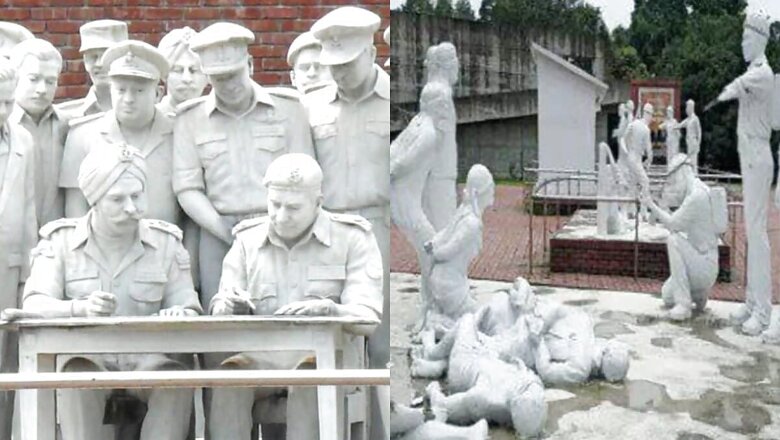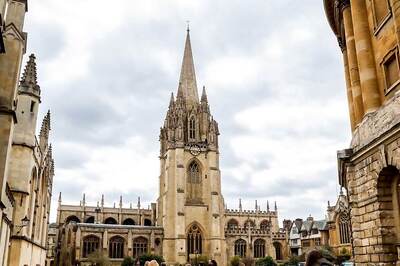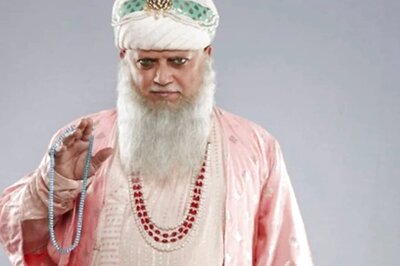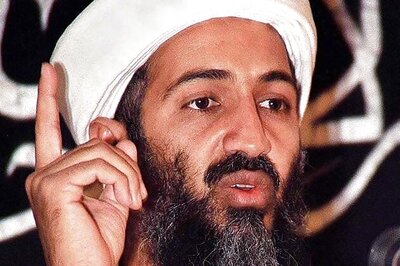
views
Senior Congress leader Shashi Tharoor on Monday shared pictures of statues at the Liberation War Memorial Complex in Bangladesh’s Mujibnagar, claiming that they have been destroyed by “anti-India vandals”. But, some internet users warned against sharing false images promoting fake narratives.
One of the images shared by Tharoor is that of a statue representing the signing of the Pakistani Instrument of Surrender between India and Pakistan to end the Bangladesh Liberation War in 1971. The other picture shows some statues scattered on the floor.
Sad to see images like this of statues at the 1971 Shaheed Memorial Complex, Mujibnagar, destroyed by anti-India vandals. This follows disgraceful attacks on the Indian cultural centre, temples and Hindu homes in several places, even as reports came in of Muslim civilians… pic.twitter.com/FFrftoA81T— Shashi Tharoor (@ShashiTharoor) August 12, 2024
However, an X user pointed out that the picture showing statues on the floor is, in fact, a sculpture depicting atrocities by the Pakistan Army on the people of Bangladesh during the liberation war. The user, identified as Neeraj Rajput, said these are not destroyed statues as is being claimed by “journalists, veterans and ex-ministers” but statues sculpted in that manner.
Rajput claimed to have visited Mujibnagar in 2016 and shared some pictures from that visit on social media as a “throwback” in 2018. The user said the 1971 memorial is under the Bangladesh Army, so it may have survived any kind of vandalism.
“Warning: Don’t fell into trap of fake narrative. The ‘71 war sculptor memorial at #Mujibnagar in Khulna distt of Bangladesh depicts people/statues lying as can be seen in my ‘18 tweet. Those are not destroyed statues. Many journalists, veterans and ex ministers are sharing it. May be it survived as its under the custody of BangladeshArmy. So, be cautious in sharing‼️” the user said on X.
Warning ⚡️: Don’t fell into trap of fake narrative. The ‘71 war sculptor memorial at #Mujibnagar in Khulna distt of #Bangladesh depicts people/statues lying as can be seen in my ‘18 tweet. Those are not destroyed statues. Many journalists, veterans and ex ministers are sharing… pic.twitter.com/N84U2ASYk5— Neeraj Rajput (@neeraj_rajput) August 12, 2024
What did Congress MP Shashi Tharoor say?
In his post on X, Tharoor shared the images and condemned the “anarchic excess” in Bangladesh. He appealed to the newly formed interim government led by Nobel laureate Muhammad Yunus to take steps to restore law and order. “Sad to see images like this of statues at the 1971 Shaheed Memorial Complex, Mujibnagar, destroyed by anti-India vandals,” he said in a post on X.
The Congress MP from Kerala further mentioned the alleged attacks on minority communities in the aftermath of Sheikh Hasina’s dramatic ouster on August 5. Hindu and other minorities have been protesting in Dhaka demanding their protection even as Yunus is set to meet students and youth from these communities in the afternoon.
“This follows disgraceful attacks on the Indian cultural centre, temples and Hindu homes in several places, even as reports came in of Muslim civilians protecting other minority homes and places of worship,” he said.
He further pointed out the “agenda of some of the agitators”, which he said is “clear”, and reaffirmed India’s support to the country. “It is essential that @Yunus_Centre and his interim government take urgent steps to restore law & order in the interests of all Bangladeshis, of every faith. India stands with the people of Bangladesh at this turbulent time, but such anarchic excess can never be condoned,” he added.
The new interim government of Bangladesh faces a colossal task after the fall of the Hasina government, which was triggered by students protesting alleged discrimination in government quota jobs. At least 450 people have been killed in the deadly violence lasting more than a month.
What is the Liberation War Memorial Complex?
The memorial complex is located in Mujibnagar, a historically significant town where the provisional government of Bangladesh took oath after the liberation war in 1971. The town was renamed Mujibnagar from Baidyanathtala in honour of the then imprisoned Sheikh Mujibur Rehman, known as the founding father of the country.
The 1971 war did not only culminate in Bangladesh’s liberation, but Pakistan suffered heavy losses after India joined the war. The Instrument Of Surrender was signed to end the Bangladesh Liberation War and the Indo-Pakistan War, by the Indian Army’s Lt Gen Jagjit Singh Aurora and Pakistan Army’s Lt Gen AAK Niazi. This marked the surrender of 93,000 Pakistani soldiers, making it the largest surrender since the World War II.




















Comments
0 comment